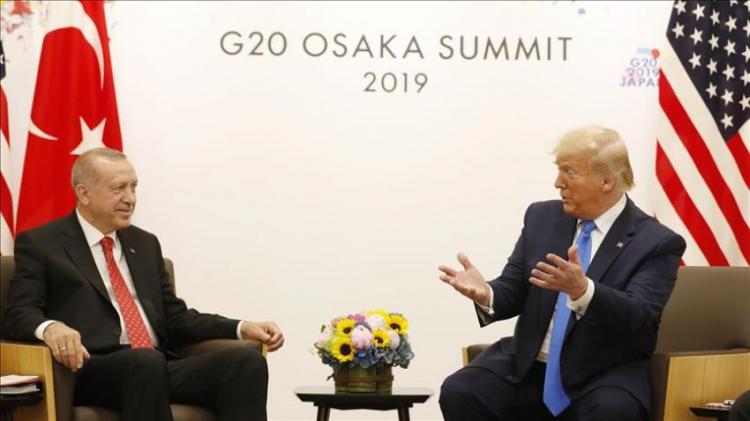Washington’s Seriousness to Impose Sanctions on turkey, Requests for Reconsideration
Washington – North Press Agency
Hadeel Oueis
Among important issues to be discussed by leaders on the sidelines of the G20 summit in Japanese Osaka, is the tense Turkish-American relationship during a bilateral meeting between the US President Donald Trump and the Turkish President Erdogan.
“Preventing Russia from destroying the NATO system is the best of what Trump can do.” Nicholas A. Heras, a Fellow at the Center for New American Security (CNAS), told North-Press.

“The issue of Turkey’s purchase of the S-400 missile system is very seriously considered in Washington and has several dimensions, although Erdogan plans to hold difficult talks on Saturday to persuade Trump to abandon the sanctions, it’s not that easy though.”
“My meeting with President Trump during the G20 summit will be important to remove the deadlock in the bilateral relations and strengthen our cooperation,” Erdogan told the Japanese Nikkei Asian Review on the sidelines of the summit.
In his turn, President Trump said the United States is facing a complicated position on how to respond to Turkey’s deal to purchase the Russian S-400 system, Trump revealed that possible sanctions are under consideration.
As the US Congress plans to impose direct sanctions on Turkey if it receives the Russian S-400 missile system.
While Erdogan seems confident in receiving the mentioned system without being subjected to sanctions, “I do not know if NATO countries have started imposing sanctions on each other, I have not heard anything like that from President Trump”.
On the other hand, the Turkish Defense Minister Hulusi Akar has met the US Special Representative for Syria Engagement James Jeffrey on Thursday in Brussels, in an attempt to make progress on a deadlock between the two countries, the establishment of a safe zone in northern Syria.
Regarding this issue, the senior analyst at the Jamestown Foundation Nicholas A. Heras said, “Ambassador Jeffrey is playing a long-term game with Turkey, aiming to resolve all the side conflicts arising from the US-Turkish tensions, including finding solutions to the Syrian issue and trying to reach a peace process between the Kurdistan Workers’ Party (PKK) and Turkey, as it may sound good to Turkey, especially after the defeat of the ruling Turkish party in the municipal elections in Istanbul, and the role of the Kurds in this defeat”.
“Jeffrey’s team is betting on Ankara to ease its grip towards the Kurds after Erdogan’s defeat in Istanbul,” Harris said.
According to Harris, Jeffrey has a sense that Erdogan is willing to focus on the Kurdish voters inside Turkey and show some decline in Syria, “It’s a big bet but it’s going on in Jeffrey’s and his team’s mind”.
A new US ambassador to Turkey
The US Senate approved on Friday the appointment of David Satterfield, as Turkey’s new ambassador, as the US embassy in Ankara announced.
During the tenure of former President Barack Obama, Satterfield served as the Director General of the Multinational Force and Observers in Rome from 2009 to 2013 and from 2014 to 2017.
In 2014, Satterfield was appointed as special adviser for the US envoy to Libya, specifically in Tripoli.
During George W. Bush’s presidency, Satterfield was Iraq’s affairs coordinator and the chief foreign ministry adviser from 2006 to 2009.
Also, he held senior positions in the US missions to Syria, Saudi Arabia, Egypt, and Lebanon.
While the position of the US ambassador to Turkey remained vacant since October 2017, amid successive crises between Ankara and Washington.

